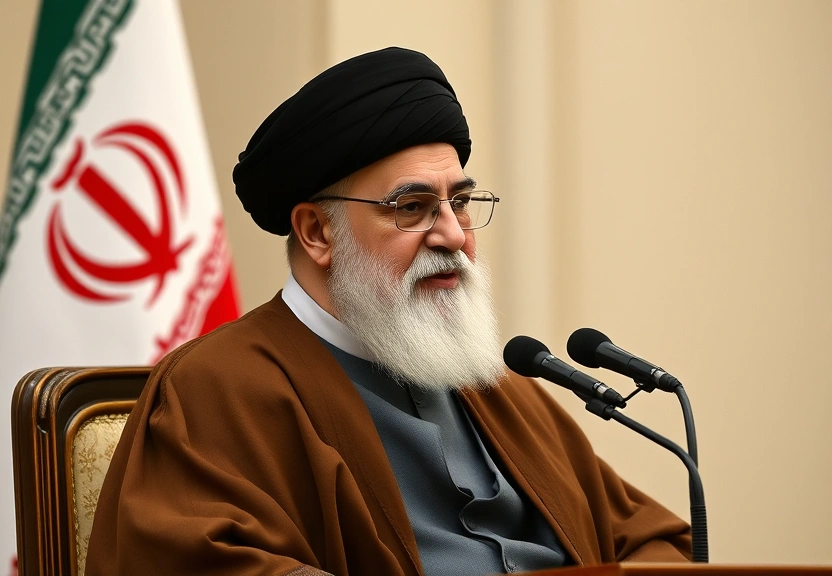Iran’s Supreme Leader Slams US Nuclear Proposal, Vows to Continue Uranium Enrichment
In a recent statement that has reverberated through international diplomatic circles, Iran’s Supreme Leader, Ayatollah Ali Khamenei, has vehemently rejected a proposal from the United States aimed at curbing Iran’s nuclear program. This assertion comes amid escalating tensions between Tehran and Washington, and a backdrop of ongoing negotiations regarding Iran’s nuclear ambitions. Khamenei emphasized that Iran would not compromise on its national independence and would persist in enriching uranium, which he framed as a matter of national sovereignty.

This article will explore the implications of Khamenei’s comments, the historical context surrounding Iran’s nuclear program, and the broader impacts on US-Iran relations. As both countries navigate this complex landscape, the stakes remain high, not just for the nations involved but for global security and diplomatic relations.
Understanding Iran’s Nuclear Program
Iran’s nuclear program has been a source of contention for decades, drawing scrutiny and sanctions from various international bodies. The program initially emerged in the 1950s under the U.S.-backed Shah, but it has since evolved into a focal point of geopolitical tension. The current tensions can be traced back to the 2015 Joint Comprehensive Plan of Action (JCPOA), an agreement designed to limit Iran’s nuclear capabilities in exchange for sanctions relief. However, the U.S. withdrawal from the JCPOA in 2018 under President Donald Trump marked a significant turning point.
The Path to Uranium Enrichment
Uranium enrichment is a critical component of Iran’s nuclear pursuits, allowing the country to produce fuel for nuclear reactors and, potentially, nuclear weapons. The level of enrichment and the facilities used are primary concerns for the international community. Iran maintains that its nuclear ambitions are peaceful, aimed at energy production and medical applications. However, the suspicion surrounding its intentions has led to numerous negotiations, sanctions, and diplomatic interventions.
Khamenei’s Rejection of the US Proposal
The recent comments by Khamenei reflect Iran’s staunch position against perceived external pressures to limit its nuclear activities. He has labeled the U.S. proposal as an infringement on Iran’s autonomy and stated unequivocally that the nation will continue its uranium enrichment process. This defiance serves as a rallying call for domestic support, reinforcing the narrative of national pride and resistance against foreign intervention.
Implications for US-Iran Relations
The relationship between the United States and Iran has been fraught with animosity since the 1979 Iranian Revolution. Khamenei’s remarks indicate a further deterioration of diplomatic relations, making it clear that any U.S. proposal perceived as coercive will be met with resistance. This ongoing tension complicates any potential negotiations aimed at reaching a new agreement on Iran’s nuclear program.
International Reactions to Iran’s Stance
The global response to Khamenei’s statements has been mixed. European nations, which played a significant role in the JCPOA negotiations, are concerned about the implications of continued uranium enrichment and the potential for nuclear proliferation. They have urged both parties to return to the negotiation table. Meanwhile, countries like Israel, which view Iran’s nuclear capabilities as an existential threat, have intensified their calls for military and diplomatic action against Iran.
Potential Consequences for Regional Stability
The ongoing enrichment of uranium and the rejection of U.S. proposals may lead to increased instability in the Middle East. Neighboring countries, particularly those in the Gulf region, are closely monitoring the situation, as any escalation could disrupt oil supplies and heighten military tensions. The fear of a nuclear-armed Iran has prompted some nations to consider their nuclear options, further complicating the regional security landscape.
Key Points to Consider
- Khamenei has rejected U.S. proposals to limit Iran’s nuclear program.
- The Iranian Supreme Leader emphasizes national independence and sovereignty.
- Uranium enrichment remains a central issue in Iran’s nuclear ambitions.
- The rejection of proposals could further strain U.S.-Iran relations.
- Global reactions vary, with European nations urging diplomacy and Israel advocating for action.
Frequently Asked Questions (FAQ)
1. What is Iran’s current status regarding uranium enrichment?
Iran continues to enrich uranium at levels beyond those agreed upon in the JCPOA, asserting its right to do so for peaceful purposes while facing international scrutiny.
2. How has the U.S. responded to Iran’s nuclear advancements?
The U.S. has implemented sanctions and diplomatic measures aimed at curbing Iran’s nuclear program, particularly following the withdrawal from the JCPOA in 2018.
3. What impact does Khamenei’s statement have on the possibility of future negotiations?
Khamenei’s firm stance against U.S. proposals suggests that future negotiations may be challenging, as Iran prioritizes its national independence over external pressures.
4. How does the international community view Iran’s nuclear program?
Opinions vary, with some countries expressing concern over potential nuclear proliferation, while others support Iran’s right to pursue nuclear energy under the terms of the NPT (Non-Proliferation Treaty).
5. What are the potential regional implications of Iran’s uranium enrichment?
Continued uranium enrichment by Iran could lead to increased tensions in the Middle East, prompting neighboring countries to reconsider their own security and defense strategies.
Conclusion
Iran’s Supreme Leader’s rejection of U.S. nuclear proposals and insistence on continuing uranium enrichment underscores the deep-rooted complexities of international diplomacy surrounding Iran’s nuclear ambitions. As tensions rise and the geopolitical landscape shifts, the need for constructive dialogue remains paramount. Both Iran and the U.S. face significant challenges in navigating their relationship, with global implications for security and stability. The coming months will be critical in determining whether diplomatic avenues can be pursued, or if the situation will escalate further, impacting not just the involved nations but the broader international community as well.
📰 Original Source
Este artigo foi baseado em informações de: https://www.cnn.com/2025/06/04/middleeast/iran-nuclear-enrichment-deal-trump-intl


